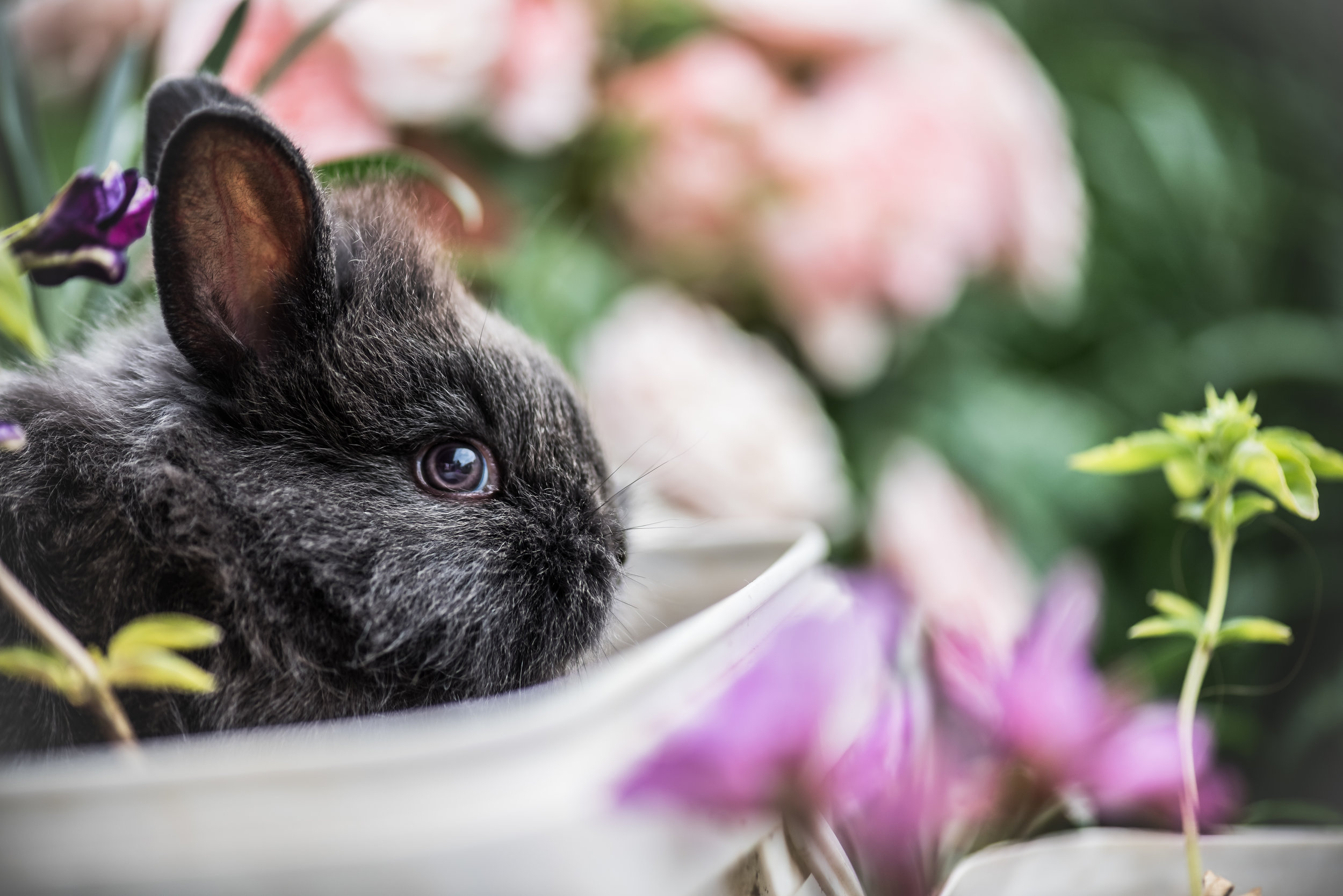Rabbits are social, curious and cuddly and make great family pets. Rabbits require the right environment, a complete and balanced diet and plenty of love and attention to ensure they are happy and healthy. If you are thinking of adding a rabbit to your family here are some important tips about being a responsible pet owner.
Find a local vet
When you get a new pet, its important to find a local vet and book a health check. Our vets will not only check your rabbit’s general health but will also discuss a preventative healthcare routine including vaccinations, parasite control, de-sexing and nail trimming. It is also a great time to ask about any questions you might have such as nutrition, exercise, dental care and breeding if appropriate.
All pets require a minimum of one health check per year. Regular health checks are a great way to keep your pet in top shape. They also help your veterinarian to identify and treat any health concerns before they become serious.
Always be on the lookout for slight changes in appetite or habits as rabbits are good at hiding illness. It is also important that all rabbits are treated at the same time, as some illnesses will spread to other cage members. If you have any concerns about your rabbits health contact your local vet.
Suitable home
You will need an enclosure or hutch as large as possible for your rabbit that allows them to exhibit natural behaviours such as:
· Standing up without ears touching the top of the cage
· Lying down and stretching out
· Moving around to feed and drink
· Take at least 3 hops in either direction of the enclosure
Cage design and location
The ideal home for your rabbit is a predator proof hutch that has an enclosed weather proof area, offering a secure dark sleeping place with a run attached that allows them plenty of space to exercise and get some natural light and fresh air. Ideally you should install a fly screen small enough to prevent mosquitos and flies from entering the hutch. Line the hutch with newspaper covered with soft grass or hay for bedding.
Rabbits need to feel safe and are susceptible to heat stress or sudden changes in temperature. Keep their enclosure out of reach from other animals and away from direct sunlight or draughts.
You can also keep your rabbit inside the house, which is great for spending more time with your rabbit, regulating their temperature and reducing exposure to diseases, predators and pests. For exercise, you can let your rabbit run around the home while supervised, however make sure your house is rabbit proof by removing, hiding or fencing off any parts of your house that can cause harm to your pet. Ideally your indoor rabbit should have access to a safe place outdoors some of the time.
Social needs
Rabbits are very social and are generally happiest when kept with other rabbits that they are compatible with. This can take some time and patience, as not all rabbits will get along. However, if successful will improve your rabbits quality of life. If you are bringing more than one rabbit home, ensure they are single sexed or de-sexed to help eliminate aggression and stop them reproducing.
Cleaning the hutch
Whilst rabbits are relatively clean, you will need to clean their hutch out regularly. This includes removing any droppings, uneaten vegetables from the day before, cleaning and refilling their water and litter tray and adding fresh newspaper, hay or grass to the cage. A spot clean should be completed daily, followed by a more thorough clean twice a week.
Toilet Training
Rabbits are generally very clean animals and will pick a specific spot to go to the toilet, usually in a corner. Place a litter tray in the area your your rabbit currently uses as a toilet, then pick up any accidents outside the tray and move them into the tray. It’s a good idea to litter train both indoor and outdoor rabbits as it makes cleaning easier and reduces the wear on the hutch.
Fill your litter tray with shredded newspaper. Do not use clay/clumping cat litter, as it can be fatal to rabbits.
Rabbits like to eat hay and go to the toilet at the same time so place hay next to the litter to encourage litter usage.
Diet and nutrition
Rabbits are herbivores and grazing animals so they need plenty of roughage to chew on. Their teeth are also constantly growing so regular eating helps to keep their teeth trim and healthy. They must have access to fresh food and water at all times. Your rabbit will need:
Constant source of fresh hay or grass for food and bedding. Fresh hay should make up the bulk of your rabbits diet as it provides the essential fibre needed for good digestive health, whilst also helping to wear your rabbit’s teeth down.
Daily supply of fresh vegetables & herbs. Great examples include leafy green lettuce, bok choy, mint, parsley and coriander. Other vegetables that are great to feed a couple of times a week include broccoli, brussel sprouts, celery, carrots and cabbage. If you are growing your own vegetables, make sure they are free from pesticides as these can be harmful to your pet.
Rabbit pellets can be fed sparingly, however should only be given as supplement to their diet, not be the main part.
Fruit can be given as a treat, but only in small amounts due to the sugar content. This could include strawberries, raspberries, bananas, pineapple and apple (no seeds).
There are many foods that can be harmful to their health and cause digestive problems. DO NOT feed your rabbit grains, cereals, nuts, lawn clippings, garden shrubs, rhubarb leaves or human food such as chocolate, bread, biscuits, chips or pasta.
Your rabbit will need plenty of fresh, clean water. You can use a bowl, bottle or water dispenser. The water will need to be cleaned and changed daily.
Grooming
Brushing & grooming is an important part of rabbit care. To remove excess hair, tangles, grass or straw, gently brush your rabbit with a soft, bristled brush. Grooming is a great opportunity to check for cuts, lumps or bumps and is a perfect bonding activity between you and your pet. If their nails are too long, take your rabbit to your local vet for a trim. They can teach you in person how to trim your pet’s nails in the future.
Exercise and socialisation
Rabbits thrive when given lots of love and attention and opportunities to exercise and play. They should have at least two hours outside of their hutch each day to exercise.
Make their hutch interesting by providing space to run around, jump, dig and explore such as tunnels, food-stuffed toys, cardboard boxes and trays filled with dirt for digging. This will help keep them entertained when you are not there. You can also give them chewing toys to help entertain them and wear their teeth down such as wooden branches (remove any smaller protruding branches that may poke into their eyes) and cardboard.
Frequent handling and attention is essential to your rabbit’s happiness. Enjoy spending time with them each day. Speak with them, play with them, cuddle them and pat them often.
Have some fun and teach your rabbit some cool tricks such as coming when called, turning in circles, sitting up, and jumping through hoops.
Let them loose by providing daily floor time in an enclosed space. A playpen is ideal which can be set-up indoors (on an easy to clean surface) or outdoors (if its not too hot or cold). If outdoors, keep an eye on your rabbit at all times as they can easily slip through small openings and escape. Predators such as foxes can get into even the most secure cages.
Taming your pet
Your rabbit will need to get used to its new family. Help them become familiar with your voice and smell by sitting or lying next to their cage and talking to them with the door open. Watch for cues, if they approach you, gently pat and talk to them. Let the rabbit out in a rabbit proof room and sit on the floor. Give them a chance to approach you. When they do gently pat or hand feed them. Handle them carefully, securely and gently and spend time with them each day and they will become confident in your care and look forward to your company.











